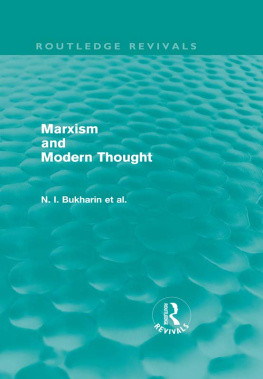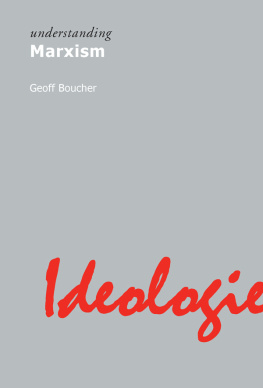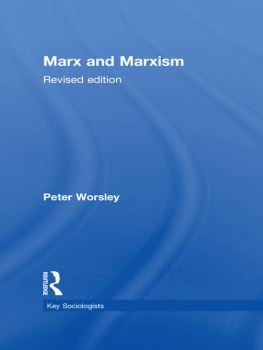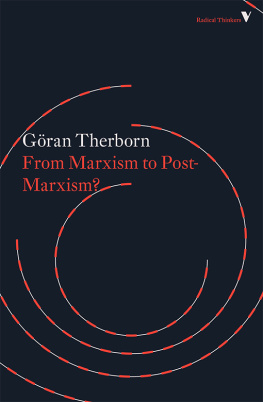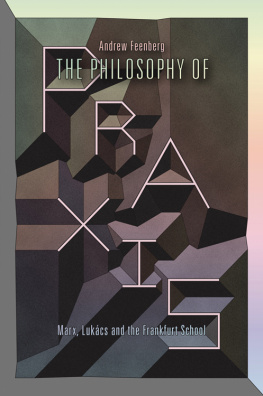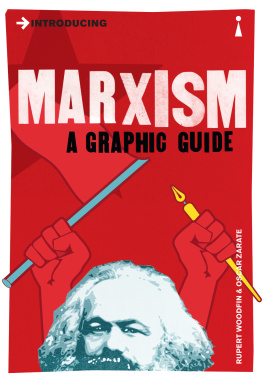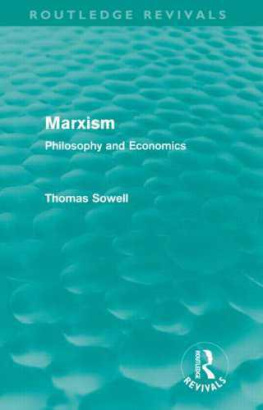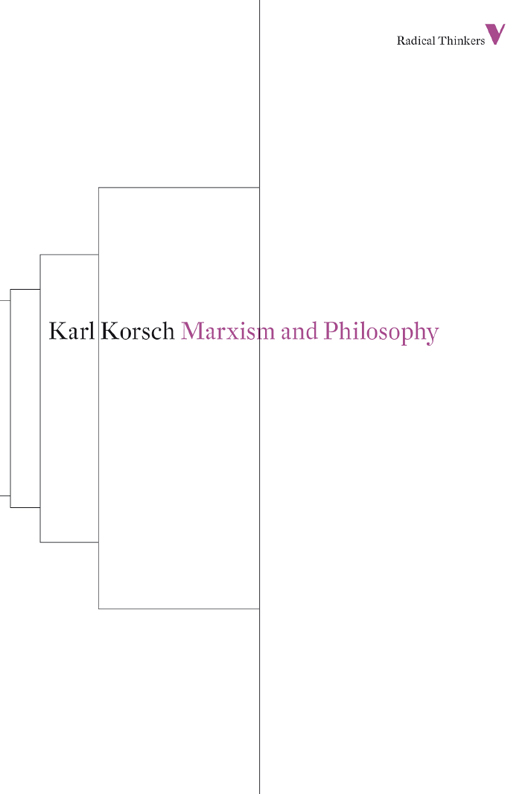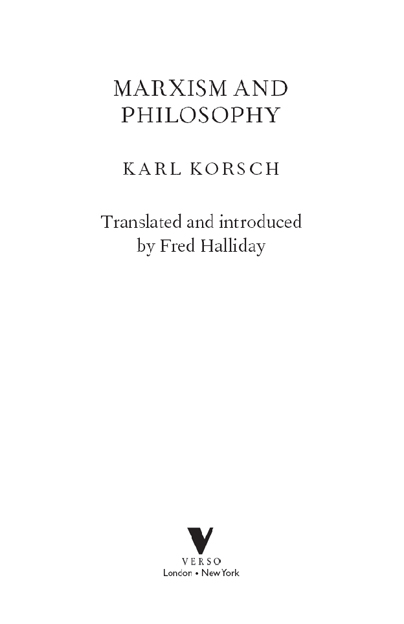Published by Verso 2012
Verso 2012
Published by New Left Books 1970
Translation and introduction Fred Halliday 1970
All rights reserved
The moral rights of the authors have been asserted
Verso
UK: 6 Meard Street, London W1F 0EG
US: 20 Jay Street, Suite 1010, Brooklyn, NY 11201
www.versobooks.com
Verso is the imprint of New Left Books
ISBN-13: 978-1-78168-027-8
eISBN-13: 978-1-78168-039-1 (US)
eISBN-13: 978-1-78168-991-2 (UK)
British Library Cataloguing in Publication Data
A catalogue record for this book is available from the British Library
Library of Congress Cataloging-in-Publication Data
A catalog record for this book is available from the Library of Congress
v3.1
Karl Korsch
An Introduction
Karl Korsch was born on 15 August 1886 in Todstedt, near Hamburg. His father was a bank official who came originally from an East Prussian family of small farmers. After some time in Todstedt, the family moved to Meiningen, in Thuringia, where Korsch attended the local secondary school. Later he attended the universities of Munich, Berlin, Geneva and Jena. He studied law, economics and philosophy and was also a member of a Free Student Movement which was opposed to the reactionary and nationalist student fraternities (Verbindungen) and aimed to establish contacts between the academic world and the socialist movement. In 1910 he acquired his doctorate at Jena, with a thesis on the onus of proof in admissions of guilt. It was published a year later in Berlin.
Between 1912 and 1914 Korsch continued his studies in London. He joined the Fabian Society, and was strongly influenced by the syndicalist movement. In his early years, he In 1913 he married Hedda Gagliardi, by whom he had two daughters. They remained together throughout his life and frequently cooperated in theoretical work.
On the outbreak of the First World War, in August 1914, Korsch returned to Germany. Because he opposed the war he was demoted from the rank of a reserve lieutenant to a corporal; but although he never carried a weapon, he was wounded and twice decorated with the Iron Cross. After the war, in 1919, he became a lecturer at Jena University.
The war marked the beginning of his active political life and of his most intense period of theoretical production. In 1917 he joined the Independent German Socialist Party (USPD) which had split from the official German Social Democratic Party (SPD) to the left. When the USPD itself split in 1920, Korsch went with the majority faction into the German Communist Party (the KPD) although he had reservations about the Twenty-one Points which formed the Leninist conditions for membership of the Communist International. In this period, after the November 1918 overthrow of the Kaiser and the declaration of the Weimar Republic, much of Europe, and particularly Germany, was in a state of Korsch participated actively in this movement which he believed to be realizing many of the ideas he had developed in pre-war London. He was a member of the Berlin Socialization Committee and contributed to the revolutionary magazine Arbeiterrat.
His writings on workers councils over this period fall into two phases: between 1918 and 1920 they reflected the immediacy and optimism of the movement; between 1920 and 1922 they expressed its decline in activity and the need for more critical reflection. When the movement was at its height he concentrated on elaborating a hypothetical economic system for a national economy based on workers councils. Each plant was to be run by a factory council, which was to be the constitutive institution of proletarian democracy. In What is Socialization? (March 1919) he sets out a system of economic organization, called industrial autonomy, in which every branch of the national industry would be run by a committee coordinating the interests of both producers and consumers.in the second stage, labour itself would be socialized and workers would be paid according to their needs. In this work Korsch is concerned not only to provide the positive content he felt was absent from pre-war socialism, but also to attack the reformist and social-democratic concepts of nationalization and workers participation then prevalent in Germany, which served to deflect the councils movement from its revolutionary aims. These reformist conceptions found their expression in a Reichstag law of February 1920.
As German capitalism consolidated itself, and the councils movement declined, Korsch tried to analyse the reasons for the failure of the upsurge of 191820. While other Marxists correctly stressed the absence of a revolutionary organization to seize power, Korsch emphasized that the theoretical and cultural preconditions for such a seizure of power were also lacking. In the fateful months after November 1918, when the organized political power of the bourgeoisie was smashed and outwardly there was nothing else in the way of the transition from capitalism to socialism, the great chance was never seized because the socio-psychological preconditions for its seizure were lacking. For there was nowhere to be found any decisive belief in the immediate realizability of a socialist economic system, which could have swept the masses along with it and provided a clear knowledge of the nature of the first steps to be taken. It assumes throughout that the suspension of political life in the Soviets in Russia was a merely temporary occurrence, imposed on the Bolsheviks by famine and Civil War.
Korschs work on factory councils and its incipient development towards Leninism contrasts with that of the Italian Marxist Antonio Gramsci, who was engaged in the Turin Soviet movement over the same period. Korsch, on the other hand, went on to develop his theory of the subjective preconditions for revolution by a critique of orthodox Marxism for its failure to provide such a theory. There is however a certain parallel with Gramsci here too. Although Gramsci emphasized the importance of the party more than Korsch, he also stressed the need for struggle in the realm of civil society, in culture and ideology, since the power of the ruling class was protected by its ideological predominance, or hegemony, over all classes of capitalist society. A major task of the proletarian revolution, argue both Korsch and Gramsci, is struggle on the ideological front. For both of them positive intervention in the sphere of ideas had to start with a general critique of fatalistic and mechanist trends in the Marxism of the Second International.
Korsch expressed this emphasis on theory by writing works at two levels. On one level, he wrote a series of pedagogic brochures and articles, designed for party members, introducing and explaining the basic concepts of Marxism. Three of these appeared in 1922. Kernpunkte der materialistischen
On another level, Korsch now prepared an analysis of the historical degeneration of Marxist theory in the Second International and of the contemporary state of Marxism. This work was Marxism and Philosophy, published in 1923. It grew directly out of the interrelation of his own intellectual biography and the objective historical development of the German revolutionary movement. It starts by arguing that neither Marxists nor bourgeois philosophers had seen the historical connection between Hegels dialectical idealism and Marxs dialectical materialism. They had also failed to understand why Hegelian philosophy died out in the 1840s. To do so would be to see the dialectical and material relationship between idealism and the bourgeoisie in its revolutionary phase, before 1848. Since Hegels idealism expressed this heroic epoch of bourgeois development, it died out when the bourgeoisie ceased to be revolutionary. The new revolutionary class was the proletariat, which found its theoretical expression in dialectical materialism. Hence the historical relationship between bourgeois philosophy and Marxist materialism could only be understood within the basic Marxist materialist outlook itself. Marxism is not a philosophy but the heir of philosophy.


